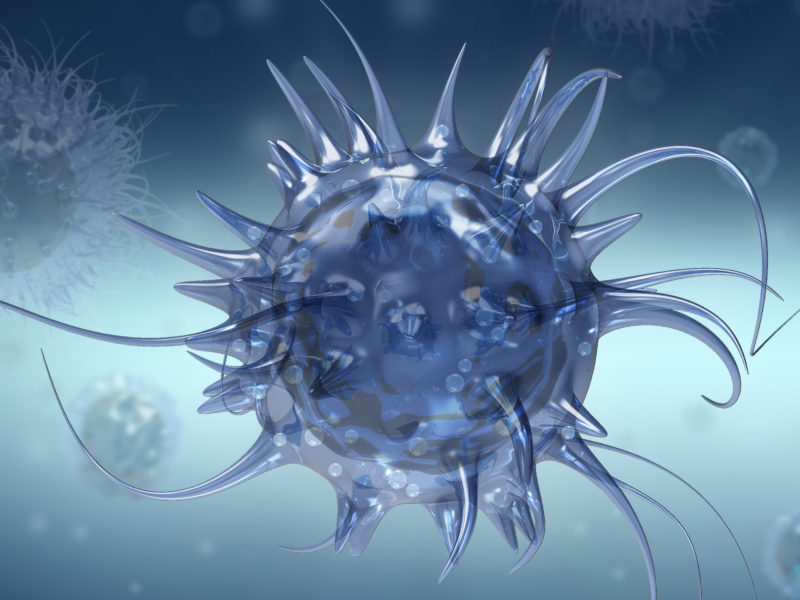Ewing Sarcoma Transcription Factor Mediates Changes in Transcription by Reprogramming Chromatin Structure
Ewing Sarcoma Transcription Factor Mediates Changes in Transcription by Reprogramming Chromatin Structure https://pediatricsnationwide.org/wp-content/uploads/2020/04/Chromatin-1140x640-1-1024x575.jpg 1024 575 Abbie Miller Abbie Miller https://pediatricsnationwide.org/wp-content/uploads/2023/05/051023BT016-Abbie-Crop.jpg- September 19, 2022
- Abbie Miller

By binding to DNA in the nucleus, the Ewing sarcoma-specific transcription factor EWS/FLI changes chromatin organization, leading to altered gene expression and the development of Ewing sarcoma.
A new report, published in Nucleic Acids Research, focuses on how the Ewing sarcoma-specific transcription factor EWS/FLI changes spatial organization of DNA in the nucleus of Ewing sarcoma cells.
EWS/FLI is known for self- associating and sticking to parts of the genome containing favorable DNA elements. Once stuck to DNA, the EWS/FLI molecules interact with each other, forming self-assembled biological units.
This activity seems to be critical to causing genes to turn on and off, and thus is critical in the development of Ewing sarcoma.
“What interested us was that in Ewing sarcoma, this self-association property of EWS/FLI may allow multiple EWS/FLI bound genomic DNA to come together and form novel DNA loops, reprogramming the spatial organization of DNA in the process,” says Iftekhar Showpnil, lead author and doctorate candidate in the lab of Stephen Lessnick, MD, PhD, director of the center for Childhood Cancer Research in the Abigail Wexner Research Institute at Nationwide Children’s Hospital.
This idea led Showpnil and team to employ next generation sequencing techniques such as Hi-C, a genomic and epigenomic technique to study chromatin structure, and CUT&Tag, (cleavage under targets and tagmentation) a method used to analyze protein-DNA interactions, to study the effects of genomic DNA occupancy of EWS/FLI on the three-dimensional chromatin landscape in Ewing sarcoma. These experiments uncovered a novel and fundamental function of the EWS/FLI mutation in reorganizing the DNA folding patterns in the cancer.
In the study, they report that EWS/FLI genomic localization is largely conserved across different patient-derived Ewing sarcoma cell lines. This binding signature was associated with establishment of topologically associated domain (TAD) boundaries, compartment activation, enhancer-promoter looping and gene activation. Importantly, local chromatin features offer a basis for observed transcriptional heterogeneity in regulation of direct EWS/FLI target genes across different Ewing sarcoma cell lines.
“For the field of pediatric cancers, it is important to recognize that chimeric proteins, such as EWS/FLI, may promote a cancer specific three-dimensional arrangement of genomic DNA that may facilitate development and/or progression of fusion-mediated cancers, such as Ewing sarcoma,” says Showpnil.
“We also demonstrated that two patient derived cell lines, having the same EWS/FLI mutation, could have significant differences in DNA folding for the same gene location.”
It is likely then, that patients with similar or identical Ewing sarcoma pathologies could show differences in the way their DNA is folding in the cancer cells. This could lead to different clinical presentations, different therapeutic responses and even different patient outcomes, explains Showpnil.
“What’s most surprising to me is that EWS/FLI was identified 30 years ago, yet we’re still discovering new biologic activities that are critical to its ability to cause Ewing sarcoma tumors. This highlights the value of the Abigail Wexner Research Institute: AWRI not only supports translational research that brings discoveries to the clinic; it also supports basic science research that lays the groundwork for new paths forward to the clinic,” says Dr. Lessnick.
“For a study like this, where we focus on re-organization of the entire genome, we relied heavily on high throughput sequencing techniques to understand the global effects of the EWS/FLI chimera on chromatin structure,” says Showpnil. “We are very fortunate to have the genomics expertise of the Steve and Cindy Rasmussen Institute for Genomic Medicine here at Nationwide Children’s, with whom we collaborated closely to design and perform our next generation sequencing experiments. We are also highly appreciative of the High Performance Computing facilities that we utilized exclusively to process and analyze the sequencing data.”
This work is part of Dr. Lessnick’s team’s Moonshot grant to address drivers of childhood cancers.
Reference:
Showpnil IA, Selich-Anderson J, Taslim C, Boone MA, Crow JC, Theisen ER, Lessnick SL. EWS/FLI mediated reprogramming of 3D chromatin promotes an altered transcriptional state in Ewing sarcoma. Nucleic Acids Research. 16 Sep 2022. doi.org/10.1093/nar/gkac747
Image credit: Nationwide Children’s
About the author
Abbie (Roth) Miller, MWC, is a passionate communicator of science. As the manager, medical and science content, at Nationwide Children’s Hospital, she shares stories about innovative research and discovery with audiences ranging from parents to preeminent researchers and leaders. Before coming to Nationwide Children’s, Abbie used her communication skills to engage audiences with a wide variety of science topics. She is a Medical Writer Certified®, credentialed by the American Medical Writers Association.
-
Abbie Millerhttps://pediatricsnationwide.org/author/abbie-miller/
-
Abbie Millerhttps://pediatricsnationwide.org/author/abbie-miller/
-
Abbie Millerhttps://pediatricsnationwide.org/author/abbie-miller/
-
Abbie Millerhttps://pediatricsnationwide.org/author/abbie-miller/







